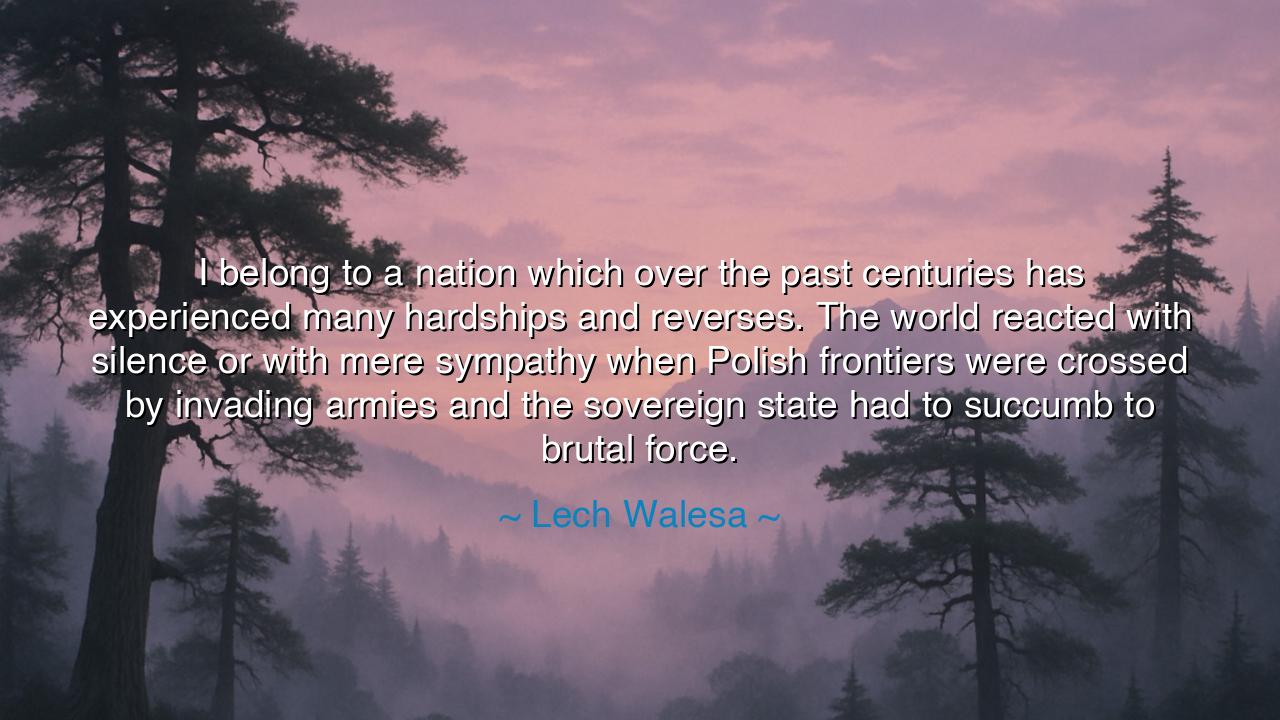
I belong to a nation which over the past centuries has
I belong to a nation which over the past centuries has experienced many hardships and reverses. The world reacted with silence or with mere sympathy when Polish frontiers were crossed by invading armies and the sovereign state had to succumb to brutal force.






Listen closely, children of the future, for the words of those who have lived through great trials and hardships carry wisdom that must not be forgotten. Lech Walesa, a man who witnessed the suffering and resilience of his people, once said: "I belong to a nation which over the past centuries has experienced many hardships and reverses. The world reacted with silence or with mere sympathy when Polish frontiers were crossed by invading armies and the sovereign state had to succumb to brutal force." In these words lies a deep sorrow and an even deeper truth about the nature of suffering, history, and the human spirit. It speaks to the pain of a people who have been forgotten or ignored by the world, yet who have persevered despite the cruelty of their circumstances.
In the ancient world, the Polish experience was not unique in its suffering. Many nations and peoples have faced moments of profound injustice—where their lands were invaded, their freedoms stripped, and their sovereignty destroyed by the force of a greater power. The Greeks, for example, faced invasion by the Persians, and yet in their darkest hour, they found the strength to unite and defeat a seemingly unstoppable foe. But it was not just victory that defined them, but their ability to stand firm in their suffering, to bear the weight of injustice with dignity. Walesa’s words call us to remember that Poland, much like ancient nations, endured not only external attacks but the deeper wounds of being forgotten by the world when it needed help most.
Consider the story of Carthage, an ancient city-state that was destroyed by the Romans after years of conflict. In the Third Punic War, Carthage was left in ruins, its people scattered, its culture nearly wiped from the map. Yet, even in their defeat, the Carthaginians maintained their identity and resolve. Much like Poland, Carthage was a nation that faced brutal force, and the world, at that time, stood by in silence. Walesa’s words reflect this same tragedy—the silent suffering of nations whose voices are lost in the shadow of powerful invaders, and the pain that lingers when the world watches, yet does not act.
The Polish people’s resilience in the face of centuries of invasion is a testament to the strength of the human spirit. Over and over, Poland has found itself under the weight of foreign oppression. In the 18th century, it was partitioned and wiped off the map by the powers of Russia, Austria, and Prussia. Yet, despite these reverses, Poland never lost its sense of identity, and the Polish people, though suffering greatly, kept the flame of their nation alive. Walesa’s journey, from the docks of Gdansk to the leadership of Solidarity, is a reflection of this same spirit—of a man and a people who refused to be crushed by the weight of history, who fought not for personal gain, but for the restoration of their nation’s dignity.
This, children, is where we find a deep lesson for our own lives. Suffering—whether it comes from external oppression, internal struggle, or the weight of the world’s indifference—is part of the human condition. But it is resilience, the ability to stand firm in the face of hardship, that defines who we are. Walesa’s words remind us that sympathy from the world may not be enough, and sometimes, it is not the aid of others but the strength within that determines whether a people or an individual will endure. The ancient heroes, from Achilles to King Leonidas, faced challenges that seemed insurmountable, yet they fought not because they expected the world’s sympathy, but because they knew the value of standing for something greater than themselves.
In our own lives, we will inevitably face moments of struggle—moments when the weight of the world seems too great, when we feel as if we are forgotten, and when forces beyond our control seem to press down upon us. But in those moments, remember the resilience of Poland, of Carthage, of the great nations and peoples who have endured and persevered through history’s darkest chapters. Do not seek sympathy, for it is in our own hearts that we must find the strength to rise. Like Walesa, choose to stand firm, to fight not for what is easy, but for what is right, for dignity, and for the restoration of honor.
So, children, carry this wisdom with you: even when the world stands silent, and when the forces of oppression seem too powerful, know that the human spirit, grounded in resolve and identity, is capable of more than we often give it credit for. Do not let the darkness define you, but let it forge you into a being of strength and resilience. The world may ignore the suffering of the few, but the power of the many, the power of the human soul, will always rise above. Stand firm, stand proud, and know that in your own battles, the true measure of your strength lies not in the world’s recognition, but in your ability to endure and to overcome.






AAdministratorAdministrator
Welcome, honored guests. Please leave a comment, we will respond soon